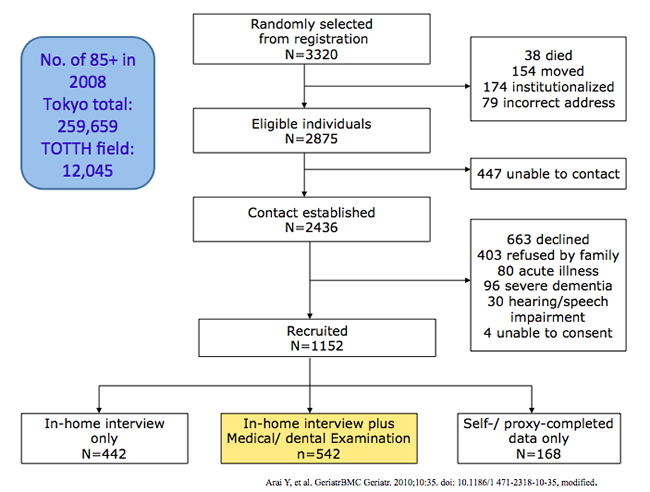The Tokyo Oldest Old Survey on Total Health (TOOTH)
※ Participation recruitment and follow up survey are both closed.
It is a goal of mankind to age with a healthy mind and body. Experts on geriatric research around the world seek answers to the question of how to live a long and healthy life. For healthy survival, it is thought that important factors include genetic polymorphism, good health (the absence of disease, etc.), personality (optimistic, conscientiousness, the ability to overcome difficulties, etc.), and environment.
Since 1992, we have been conducting a survey of centenarians (people over 100 years) to clarify that these factors were involved in achieving healthy longevity. It is necessary to verify whether the keys of health in centenarians also apply to the general elderly. Furthermore, participation in living /exercise habits and social activities, which were not elucidated in the last survey, may work advantageously for healthy longevity.
Therefore, we have organized a comprehensive research team to conduct a study of the living style and health of those over 85 who lived in central Tokyo in 2007 (TOOTH survey). The purpose of this research is to elucidate the factors that contribute to the QOL of people aged 85 and older in the physical field (medical care, nursing care), psychological domain, and in terms of social relations, and environment (economy, living environment).
In particular, we seek to identify the factors that contribute to the achievement of aging well, and that prevent the occurrence of frailty (weakness) and dementia, which are important causes of reduced independence in the very elderly, and of the eventual need for long-term care.
The TOOTH survey aims to collect scientific evidence to vigorously address health promotion and maintenance of physical function through appropriate eating and exercise habits, even beginning at 85 years of age. To this end, Prof. Satoshi Sasaki in the Department of Social and Preventive Epidemiology, School of Public Health, The University of Tokyo, and Dr. Yuko Oguma at the Sports Medicine Research Center, Keio University, are collaborating with us in a survey of dietary and exercise habits, respectively. In addition, as oral health has a big influence on meal intake, the research group of Prof. Toshimitsu Iinuma in the Department of Complete Denture Prosthodontics, Nihon University School of Dentistry, has helped us with this research.
Methods of the TOOTH survey
1・Recruitment of participants
Letters requesting study participation were mailed to 3,320 people randomly selected out of those aged 85 years or older living in Shinjuku-ku, Minato-ku, and Shibuya-ku in Tokyo from 2007–2008 in the TOOTH study. Those who gave consent underwent a questionnaire survey based on a visiting interview, and a medical dentistry survey on another day (Figure 1). Ultimately, 542 people cooperated in the medical dentistry survey.

2・Evaluation items
For healthy aging, avoiding disease is important, while daily lifestyle habits including eating and exercise, and ways of thinking about personality and life play important roles. Furthermore, from the survey of the centenarians, we determined the relationship between longevity and genetic information. Therefore, in the TOOTH study, we conducted a questionnaire survey and a health survey to analyze the activities of daily living (ADL and instrumental ADL), cognitive function, extent of physical activity, dietary habits, psychological domain (subjective health view, depression scale, quality of life, morale index), social relations, environmental field (subjective economic situation, IT equipment use) and medical dental evaluations (interview, physical findings, blood pressure / physical measurements, physical strength measurements, nutritional investigations, carotid pulse echo, bone density , blood sample test, dental checkup, component analysis of saliva) (Figure 2).
3・Tracking (follow-up) survey
We continued to check the health condition of those who participated in the basic survey every year by telephone. Follow-up surveys were conducted for three years (2010–2011) and six years (2014–2015) after the basic survey. In these surveys, the same questionnaire survey and medical dentistry survey were performed as in the initial basic survey. In addition, subjects who scored good cognitive function results throughout the survey also received brain MRI examinations.
※ For details regarding the survey method, please refer to Arai Y, Iinuma T, Takayama M, Takayama M, Abe Y, Fukuda R, Ando J, Ohta K, Hanabusa H, Asakura K, Nishiwaki Y, Gondo Y, Akiyama H, Komiyama K, Gionhaku N, Hirose N. The Tokyo oldest old survey on total health (TOOTH): a longitudinal cohort study of multidimensional components of health and well-being. BMC Geriatr 2010; 10: 35.

